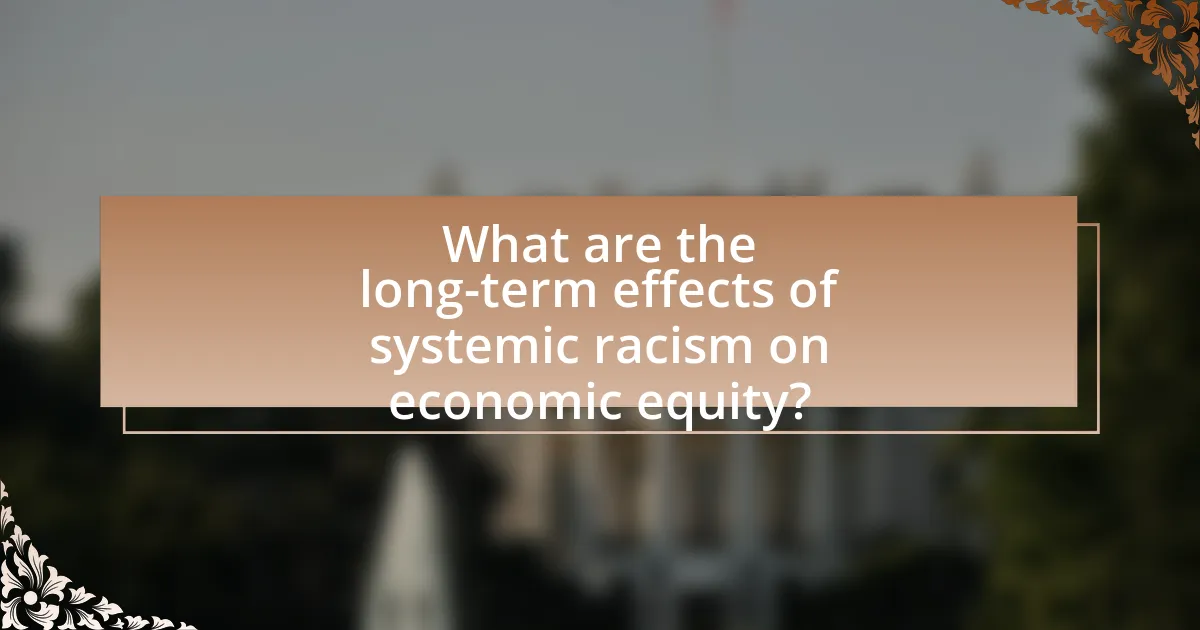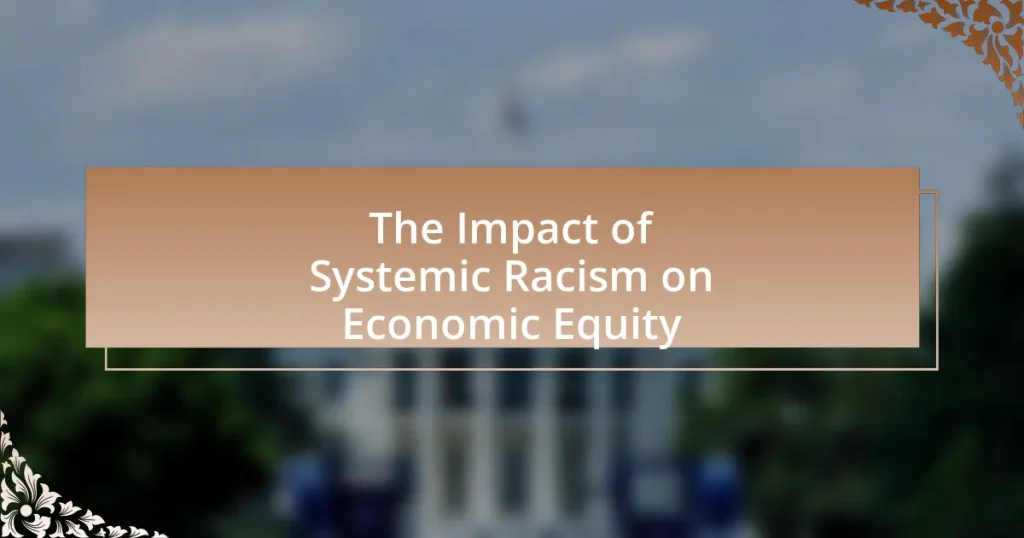The article examines the impact of systemic racism on economic equity, highlighting how historical injustices and discriminatory practices perpetuate wealth and income disparities among racial and ethnic groups. It discusses the manifestation of systemic racism in economic systems, including barriers to education, employment, and housing, which contribute to ongoing cycles of poverty. The article also explores the historical roots of these inequities, the consequences for marginalized communities, and the importance of promoting economic equity to foster societal well-being. Additionally, it outlines strategies for addressing systemic racism through policy reforms, community engagement, and equitable business practices.

What is the Impact of Systemic Racism on Economic Equity?
Systemic racism significantly undermines economic equity by perpetuating disparities in wealth, income, and access to resources among racial and ethnic groups. For instance, data from the Federal Reserve indicates that the median wealth of White families is approximately ten times greater than that of Black families, highlighting a stark economic divide rooted in historical injustices and discriminatory practices. Additionally, systemic barriers such as unequal access to quality education, employment opportunities, and housing contribute to the ongoing cycle of poverty and economic disadvantage for marginalized communities. These factors collectively illustrate how systemic racism not only affects individual livelihoods but also hinders overall economic growth and stability within society.
How does systemic racism manifest in economic systems?
Systemic racism manifests in economic systems through discriminatory practices that limit access to resources, opportunities, and wealth accumulation for marginalized racial groups. For instance, historical redlining policies in the United States systematically denied Black families access to mortgages and homeownership, resulting in significant wealth disparities; studies show that Black households have approximately one-tenth the wealth of white households. Additionally, employment discrimination, where racial minorities face barriers in hiring and promotions, further exacerbates economic inequality, as evidenced by research indicating that resumes with traditionally Black-sounding names receive fewer callbacks compared to those with white-sounding names, despite identical qualifications. These practices create a cycle of poverty and limited economic mobility for affected communities, reinforcing systemic inequities in the economic landscape.
What are the historical roots of systemic racism in economic policies?
The historical roots of systemic racism in economic policies stem from discriminatory practices established during the era of slavery and reinforced through Jim Crow laws and redlining. These policies systematically marginalized Black individuals and other minorities, limiting their access to wealth-building opportunities such as home ownership and quality education. For instance, the Federal Housing Administration’s policies in the 1930s explicitly favored white homeowners while denying loans to Black families, entrenching economic disparities. Additionally, the GI Bill post-World War II disproportionately benefited white veterans, further widening the racial wealth gap. These historical injustices have created a legacy of economic inequality that persists today, evidenced by significant disparities in income, wealth, and employment rates among racial groups.
How do discriminatory practices affect access to economic opportunities?
Discriminatory practices significantly limit access to economic opportunities by creating barriers that prevent marginalized groups from fully participating in the economy. For instance, systemic racism can manifest in hiring biases, unequal access to education, and discriminatory lending practices, which collectively hinder individuals from obtaining quality jobs, advancing in their careers, or securing loans for businesses. According to a report by the Economic Policy Institute, Black workers face a 20% higher unemployment rate compared to their white counterparts, illustrating the direct impact of discrimination on economic access. Furthermore, a study by the Federal Reserve found that minority-owned businesses are less likely to receive funding, which restricts their growth potential and overall economic contribution. These statistics underscore how discriminatory practices perpetuate economic inequities and limit opportunities for affected individuals and communities.
Why is economic equity important in the context of systemic racism?
Economic equity is crucial in the context of systemic racism because it addresses the disparities in wealth and opportunity that disproportionately affect marginalized communities. Systemic racism creates barriers to economic resources, such as access to quality education, employment opportunities, and capital, which perpetuates cycles of poverty. For instance, a report by the Institute for Policy Studies highlights that the median wealth of Black families is significantly lower than that of white families, illustrating the long-term effects of discriminatory policies and practices. By promoting economic equity, society can work towards dismantling these barriers, fostering inclusive growth, and ensuring that all individuals have equal access to economic opportunities, thereby reducing the impact of systemic racism.
What are the consequences of economic inequity on marginalized communities?
Economic inequity severely impacts marginalized communities by perpetuating cycles of poverty and limiting access to essential resources. This inequity results in lower educational attainment, as families with fewer financial resources often cannot afford quality education or extracurricular opportunities. According to the Economic Policy Institute, children from low-income families are less likely to graduate from high school, which directly correlates with reduced earning potential in adulthood.
Additionally, economic inequity leads to inadequate healthcare access, contributing to poorer health outcomes. The American Journal of Public Health highlights that marginalized communities experience higher rates of chronic diseases due to limited access to healthcare services and healthy food options.
Furthermore, economic inequity fosters social instability, as communities with high poverty rates often face increased crime and violence. The Bureau of Justice Statistics reports that areas with higher economic disparities experience elevated crime rates, which further exacerbates the challenges faced by these communities.
In summary, the consequences of economic inequity on marginalized communities include diminished educational opportunities, poor health outcomes, and increased social instability, all of which are supported by empirical research and statistical evidence.
How does economic equity contribute to overall societal well-being?
Economic equity significantly enhances overall societal well-being by promoting equal access to resources, opportunities, and services for all individuals. When economic equity is achieved, it leads to reduced poverty rates, improved health outcomes, and increased educational attainment, which collectively foster a more stable and prosperous society. For instance, research from the Institute for Research on Poverty indicates that equitable economic policies can reduce income inequality, which is linked to lower crime rates and better community cohesion. Furthermore, the World Bank has found that countries with higher levels of economic equity experience stronger economic growth and social stability, demonstrating that equitable distribution of wealth contributes to a healthier, more productive society.
What are the key indicators of economic equity affected by systemic racism?
Key indicators of economic equity affected by systemic racism include income disparity, wealth accumulation, employment rates, and access to education. Income disparity is evident in the fact that Black and Hispanic households earn significantly less than their white counterparts, with the U.S. Census Bureau reporting that in 2020, the median household income for Black families was approximately $45,870 compared to $74,580 for white families. Wealth accumulation is starkly different as well, with the Federal Reserve’s 2019 Survey of Consumer Finances showing that the median net worth of white families was $188,200, while Black families had a median net worth of just $24,100. Employment rates reflect systemic barriers, as the Bureau of Labor Statistics reported in 2021 that the unemployment rate for Black individuals was consistently higher than that of white individuals, often by several percentage points. Lastly, access to education is influenced by systemic racism, as evidenced by the disparities in funding for schools in predominantly minority neighborhoods, leading to lower educational attainment and fewer opportunities for economic advancement.
How do income disparities reflect systemic racism?
Income disparities reflect systemic racism by demonstrating how historical and institutional barriers disproportionately affect marginalized racial groups, limiting their economic opportunities. For instance, Black and Hispanic households in the United States earn significantly less than their white counterparts, with the U.S. Census Bureau reporting that in 2020, the median household income for Black families was approximately $45,870 compared to $74,580 for white families. This gap is rooted in systemic factors such as discriminatory hiring practices, unequal access to quality education, and residential segregation, which have perpetuated cycles of poverty and limited wealth accumulation for these communities. Additionally, studies show that Black applicants are often less likely to receive job offers than equally qualified white applicants, further illustrating how systemic racism manifests in economic disparities.
What role does wealth accumulation play in economic equity?
Wealth accumulation significantly influences economic equity by determining access to resources, opportunities, and social mobility. Individuals and families with greater wealth can invest in education, healthcare, and property, which enhances their economic stability and growth potential. For instance, data from the Federal Reserve’s Survey of Consumer Finances indicates that in 2019, the median net worth of white families was approximately $188,200, compared to $24,100 for Black families, highlighting the disparities in wealth accumulation that contribute to economic inequity. This wealth gap perpetuates systemic barriers, limiting economic opportunities for marginalized groups and reinforcing cycles of poverty.
How can we measure the impact of systemic racism on economic equity?
To measure the impact of systemic racism on economic equity, researchers can analyze disparities in income, wealth, employment rates, and access to resources among different racial and ethnic groups. For instance, data from the U.S. Census Bureau indicates that in 2020, the median household income for Black families was approximately $45,870, compared to $74,580 for white families, highlighting significant income inequality. Additionally, studies such as the “Racial Wealth Gap” report by the Institute for Policy Studies demonstrate that the median wealth of white families is nearly ten times greater than that of Black families, illustrating the long-term effects of systemic barriers. By employing statistical analyses and longitudinal studies, researchers can quantify these disparities and assess the influence of policies and practices that perpetuate economic inequity.
What strategies can be implemented to address systemic racism in economic systems?
Implementing targeted policies and practices can effectively address systemic racism in economic systems. Strategies include enforcing anti-discrimination laws in hiring and lending, promoting equitable access to capital for minority-owned businesses, and investing in education and workforce development programs tailored for marginalized communities. For instance, the U.S. Small Business Administration’s 8(a) Business Development Program provides assistance to socially and economically disadvantaged individuals, demonstrating a commitment to leveling the playing field. Additionally, research from the Federal Reserve indicates that minority-owned businesses face significant barriers to accessing credit, highlighting the need for financial institutions to adopt inclusive lending practices. These strategies collectively aim to dismantle barriers and foster economic equity.
How can policy reforms promote economic equity?
Policy reforms can promote economic equity by implementing measures that address systemic barriers faced by marginalized communities. For instance, reforms such as increasing the minimum wage, expanding access to affordable healthcare, and enhancing educational opportunities can directly improve the economic conditions of disadvantaged groups. Research indicates that raising the minimum wage can lift millions out of poverty, with a 2019 study by the Economic Policy Institute showing that a $15 minimum wage could benefit over 33 million workers. Additionally, policies aimed at equitable funding for schools can reduce educational disparities, which are often rooted in systemic racism, thereby fostering a more equitable workforce. These reforms collectively contribute to leveling the economic playing field, ensuring that all individuals have fair access to opportunities and resources.
What role do community organizations play in combating economic inequity?
Community organizations play a crucial role in combating economic inequity by providing resources, advocacy, and support to marginalized populations. These organizations often focus on addressing systemic barriers that contribute to economic disparities, such as lack of access to education, employment opportunities, and financial services. For instance, according to a report by the National Community Reinvestment Coalition, community organizations have been instrumental in increasing access to affordable housing and financial literacy programs, which are essential for economic empowerment. Additionally, they advocate for policy changes that promote equity, such as fair wage laws and anti-discrimination measures, thereby directly influencing economic conditions for disadvantaged groups.

What are the long-term effects of systemic racism on economic equity?
Systemic racism has long-term effects on economic equity by perpetuating wealth disparities and limiting access to opportunities for marginalized groups. Historical practices such as redlining, discriminatory lending, and unequal education funding have systematically disadvantaged communities of color, resulting in lower home ownership rates and reduced wealth accumulation. For instance, a 2020 report from the Federal Reserve indicated that the median net worth of Black families was approximately $24,100, compared to $189,100 for white families, highlighting the stark economic divide. Additionally, systemic barriers in employment, such as biased hiring practices and wage gaps, further entrench economic inequities, leading to a cycle of poverty that is difficult to break. These factors collectively hinder economic mobility and reinforce the socio-economic status of marginalized groups over generations.
How does systemic racism perpetuate cycles of poverty?
Systemic racism perpetuates cycles of poverty by creating and maintaining barriers to economic opportunities for marginalized racial groups. These barriers manifest in various forms, such as discriminatory hiring practices, unequal access to quality education, and biased lending policies. For instance, studies show that Black applicants are often less likely to receive job callbacks compared to equally qualified white applicants, which limits their employment opportunities and income potential. Additionally, systemic racism contributes to the underfunding of schools in predominantly minority neighborhoods, resulting in lower educational attainment and reduced job prospects. Furthermore, discriminatory lending practices have historically denied minority communities access to mortgages, leading to lower home ownership rates and wealth accumulation. According to the Federal Reserve, the median wealth of white families is significantly higher than that of Black and Hispanic families, illustrating the long-term economic disparities rooted in systemic racism.
What are the implications for future generations?
The implications for future generations regarding systemic racism and economic equity include persistent wealth disparities and limited access to opportunities. Systemic racism creates barriers that hinder economic mobility for marginalized communities, resulting in a cycle of poverty that can last for generations. For instance, a report by the Institute for Policy Studies highlights that the median wealth of Black families is projected to reach zero by 2053 if current trends continue, illustrating the long-term economic consequences of systemic inequities. This ongoing disparity affects education, employment, and health outcomes, ultimately shaping the socioeconomic landscape for future generations.
How does systemic racism affect educational and employment opportunities?
Systemic racism significantly limits educational and employment opportunities for marginalized groups. This occurs through mechanisms such as unequal funding for schools, biased hiring practices, and discriminatory policies that create barriers to access. For instance, research by the National Center for Education Statistics shows that schools in predominantly minority neighborhoods receive substantially less funding than those in predominantly white areas, leading to disparities in resources, teacher quality, and academic outcomes. In employment, studies indicate that resumes with traditionally Black-sounding names receive fewer callbacks than those with white-sounding names, even when qualifications are identical, highlighting the pervasive bias in hiring practices. These systemic barriers contribute to a cycle of disadvantage that perpetuates economic inequity across generations.
What are the psychological impacts of economic inequity due to systemic racism?
Economic inequity due to systemic racism leads to significant psychological impacts, including increased stress, anxiety, and depression among marginalized communities. Research indicates that individuals facing economic disparities often experience feelings of hopelessness and low self-esteem, which can stem from chronic financial instability and limited access to resources. A study published in the American Journal of Public Health found that systemic racism contributes to mental health disparities, with marginalized groups reporting higher levels of psychological distress compared to their more privileged counterparts. This distress is exacerbated by social stigma and discrimination, further impacting mental well-being.
How does economic stress affect mental health in marginalized communities?
Economic stress significantly deteriorates mental health in marginalized communities by increasing anxiety, depression, and feelings of hopelessness. Research indicates that individuals in these communities often face higher rates of unemployment and financial instability, which contribute to chronic stress. A study published in the American Journal of Public Health found that economic hardship is linked to a 50% increase in the likelihood of experiencing mental health disorders among low-income populations. Furthermore, systemic racism exacerbates these economic challenges, limiting access to resources such as quality healthcare and mental health services, thereby intensifying the adverse effects on mental well-being.
What is the relationship between economic equity and social cohesion?
Economic equity and social cohesion are closely linked, as equitable economic conditions foster trust and cooperation among community members. When resources and opportunities are distributed fairly, individuals feel valued and included, which enhances social bonds and reduces tensions. Research indicates that societies with lower income inequality experience higher levels of social trust and civic engagement, as evidenced by studies from the OECD, which show that nations with more equitable income distribution tend to have stronger social cohesion metrics. This relationship underscores the importance of addressing economic disparities to promote a more unified and resilient society.

What actions can individuals and communities take to combat systemic racism in economic systems?
Individuals and communities can combat systemic racism in economic systems by advocating for equitable policies, supporting minority-owned businesses, and promoting financial literacy programs. Advocacy for policies such as fair wages, anti-discrimination laws, and equitable access to resources can help dismantle barriers that perpetuate economic inequality. Supporting minority-owned businesses through patronage and investment fosters economic empowerment and community resilience. Additionally, promoting financial literacy programs equips individuals with the knowledge to navigate economic systems effectively, thereby reducing disparities. Research indicates that minority-owned businesses contribute significantly to local economies, and equitable policies can lead to improved economic outcomes for marginalized communities.
How can awareness and education contribute to change?
Awareness and education can significantly contribute to change by informing individuals about systemic racism and its effects on economic equity. By increasing understanding of how systemic racism operates, individuals are better equipped to recognize injustices and advocate for equitable policies. Research indicates that educational programs addressing racial disparities can lead to increased empathy and support for anti-racist initiatives, as seen in studies conducted by the American Psychological Association, which found that awareness campaigns can shift public attitudes and behaviors towards marginalized communities. This informed perspective fosters collective action, ultimately driving societal change towards greater economic equity.
What resources are available for individuals seeking to understand systemic racism?
Individuals seeking to understand systemic racism can access a variety of resources, including books, documentaries, academic articles, and online courses. Notable books such as “How to Be an Antiracist” by Ibram X. Kendi and “The New Jim Crow” by Michelle Alexander provide in-depth analyses of systemic racism and its implications. Documentaries like “13th,” directed by Ava DuVernay, explore the historical context of racial inequality in the United States. Academic articles from journals such as the “American Journal of Sociology” and “Race and Social Problems” offer empirical research on the effects of systemic racism on economic equity. Additionally, platforms like Coursera and edX offer online courses focused on racial justice and systemic inequality, enabling individuals to learn from experts in the field. These resources collectively enhance understanding of systemic racism and its impact on economic equity.
How can community engagement foster economic equity?
Community engagement can foster economic equity by empowering marginalized groups to participate in decision-making processes that affect their economic opportunities. When communities actively engage in local governance, they can advocate for policies that address systemic barriers, such as discriminatory lending practices and unequal access to education and job training. Research indicates that inclusive community development initiatives, such as those highlighted in the “Community Development Investment Review” by the Federal Reserve, demonstrate that when residents are involved, economic outcomes improve, leading to a more equitable distribution of resources and opportunities. This engagement not only amplifies the voices of underrepresented populations but also creates a collaborative environment where diverse perspectives contribute to sustainable economic growth.
What are some best practices for promoting economic equity in local economies?
Best practices for promoting economic equity in local economies include implementing inclusive policies that support marginalized communities, fostering access to quality education and job training, and encouraging local entrepreneurship through grants and low-interest loans. Inclusive policies, such as those that prioritize affordable housing and equitable zoning, help ensure that all community members can participate in the economy. Access to education and job training programs equips individuals with the skills needed for higher-paying jobs, thereby reducing income disparities. Additionally, supporting local entrepreneurship through financial assistance can stimulate economic growth and create jobs within underserved areas, contributing to a more equitable economic landscape. These practices are essential for addressing the systemic barriers that perpetuate economic inequity.
How can businesses implement equitable hiring practices?
Businesses can implement equitable hiring practices by establishing standardized recruitment processes that minimize bias. This includes using structured interviews, diverse hiring panels, and blind resume reviews to focus on candidates’ skills and qualifications rather than personal characteristics. Research indicates that organizations with diverse hiring practices see a 35% increase in performance, as diverse teams bring varied perspectives that enhance problem-solving and innovation. Furthermore, implementing training programs on unconscious bias for all employees involved in hiring can significantly reduce discriminatory practices, leading to a more inclusive workforce.
What role does consumer choice play in supporting equitable economic practices?
Consumer choice plays a crucial role in supporting equitable economic practices by enabling individuals to direct their purchasing power towards businesses that prioritize fairness and inclusivity. When consumers consciously choose to support companies that demonstrate equitable labor practices, fair wages, and diversity in hiring, they contribute to a market environment that rewards ethical behavior and discourages systemic racism. For instance, studies have shown that businesses with diverse leadership teams are 35% more likely to outperform their competitors, indicating that consumer preferences for equity can drive economic success. By making informed choices, consumers can influence corporate policies and practices, ultimately fostering a more equitable economic landscape.
What are the next steps for advocating economic equity in the face of systemic racism?
Advocating for economic equity in the face of systemic racism requires implementing targeted policy reforms, increasing access to capital for marginalized communities, and promoting inclusive economic development initiatives. Policy reforms should focus on dismantling discriminatory practices in housing, employment, and education, as evidenced by the Fair Housing Act of 1968, which aimed to eliminate racial discrimination in housing. Increasing access to capital can be achieved through community investment programs and microfinance initiatives, which have been shown to empower minority entrepreneurs and stimulate local economies. Additionally, promoting inclusive economic development initiatives, such as workforce training programs tailored for underrepresented groups, can help bridge the economic gap created by systemic racism. These steps are essential for creating a more equitable economic landscape.










